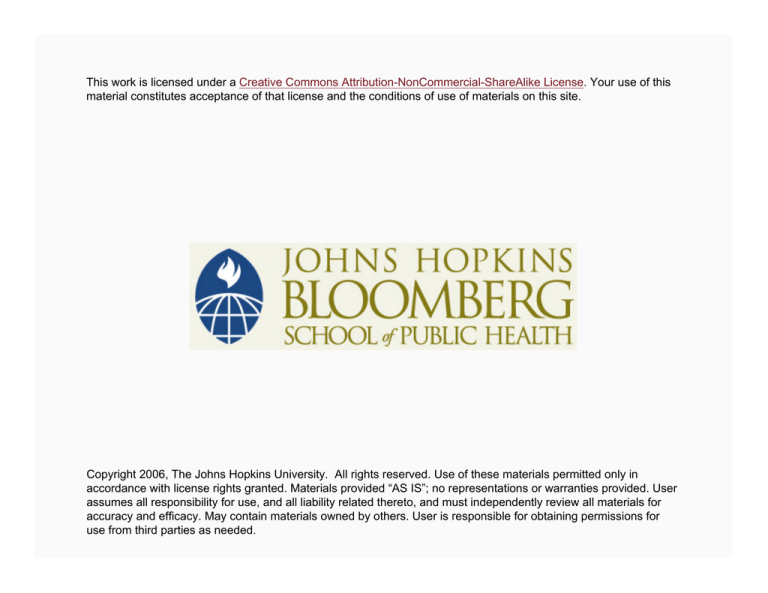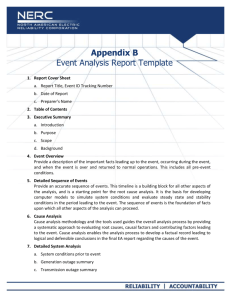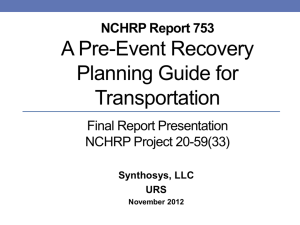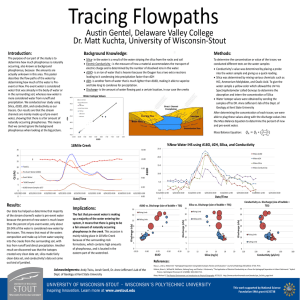
This work is licensed under a Creative Commons Attribution-NonCommercial-ShareAlike License. Your use of this
material constitutes acceptance of that license and the conditions of use of materials on this site.
Copyright 2006, The Johns Hopkins University. All rights reserved. Use of these materials permitted only in
accordance with license rights granted. Materials provided “AS IS”; no representations or warranties provided. User
assumes all responsibility for use, and all liability related thereto, and must independently review all materials for
accuracy and efficacy. May contain materials owned by others. User is responsible for obtaining permissions for
use from third parties as needed.
Improving Understanding and Collaboration
among First Responders
Sheldon Greenberg, PhD
Johns Hopkins University
Maureen Hennessy Benson, MA
Johns Hopkins University
Dave Blodgett, MD, MPH
Southwest Utah Public Health Department
Part Two of Four
Pre-Event
Pre-Event: Education
In the education phase of a crisis event:
− Information that was gained from experience is
distributed, whether through reports or training
Distribution varies from culture to culture, but in general it
begins at the lowest levels and continues throughout a
responder’s career
Some smaller agencies begin education at specialist level
4
Pre-Event: Education—Law Enforcement
What the education phase means to law enforcement:
− Law enforcement education varies across departments
and regions
X For example, crisis events are debriefed occasionally
but not as a matter of policy
− Yearly in-service training sessions, which emphasize how
to or how not to do things, rather than critical thinking or
problems solving
− Focus is on individual and his/her response
5
Pre-Event: Education—Fire Department
What the education phase means to the fire department:
− Continual training sessions
X For example, to become a Firefighter II (the minimal
level for career firefighters), fire department
personnel must receive training in hazardous
materials awareness
X Most volunteer firefighters receive this training as
well
− After action reporting
X Most career departments and some volunteer ones
require “After Action Reports” on all major incidents
X Reports are disseminated throughout the
department
6
Pre-Event: Education—Public Health
What the education phase means to the public health
workforce:
− Public health is relatively new to the first responder
world, which means that some ideas (for example,
incident command) are being taught now to public
health students and workers
− Education for public health shifting from emphasis on
workday activities to crisis response
7
Pre-Event: Education—Private Security
What the education phase means to private security:
− Training is generally determined by the specific job and
the specific company
X Some private security firms provide in-house training
(but the amount of training and subject matter vary
widely)
8
Pre-Event: Education—EMS
What the education phase means to EMS:
− EMS receives continuing medical education
− As with firefighting, EMS education emphasizes special
training
− Training teaches EMS responders to approach all
incidents carefully
9
Pre-Event: Prevention
In the prevention phase of a crisis event:
− Prevention is only possible in some cases
− Information that was distributed through education is
applied, specifically to prevent future crises from
occurring
10
Pre-Event: Prevention—Law Enforcement
What the prevention phase means to law enforcement:
− Culture focuses primarily on reaction, but has expanded
its preventative efforts over the last decade
11
Pre-Event: Prevention—Fire Department
What the prevention phase means to fire department
personnel:
− Prevention comes in the form of fire education and
deterrence
− Can pre-plan in some instances
− Culture emphasizes reaction
12
Pre-Event: Prevention—Public Health
What the prevention phase means to public health personnel:
− One of public health’s strength areas is prevention,
especially through education
− Primary prevention vs. secondary prevention
− Improving surge capacity
− Creating plans for clinics and medicine distribution
13
Pre-Event: Prevention—Private Security
What the prevention phase means to private security:
− Key player in prevention is due to the nature of the job
X Patrolling, monitoring, controlling access
14
Pre-Event: Prevention—EMS
What the prevention phase means to EMS:
− Much like law enforcement agencies and fire
departments, EMS culture does not emphasize
prevention
15
Pre-Event: Recognition
The recognition phase of a crisis event begins when an event
(or events) are finally seen as something out of the ordinary
16
Pre-Event: Recognition—Law Enforcement
Law enforcement recognizes a crisis event when:
− The organization’s resources are overloaded
− The possibility for loss of life continues
− The cause/source of the event remains unknown
− Unexplained panic or fear exists in a community
17
Pre-Event: Recognition—Fire Department
Fire departments recognize an event as a crisis when:
− Resources are overwhelmed
− A situation doesn’t improve despite the best efforts of the
personnel who are present and/or
− Firefighter safety is compromised
18
Pre-Event: Recognition—Public Health
For public health personnel, an event becomes a crisis when:
− Available resources are overwhelmed
− Surveillance shows that the track of the problem (disease,
radiation) will overwhelm current resources
− Calls for information from the public and other care
providers exceed the ability to respond adequately
− An event demands all available personnel to work in
excess of normal scope of duties
19
Pre-Event: Recognition—Private Security
An important part of private security personnel training is
learning to recognize events and notify the proper authorities
and/or emergency response resources
20
Pre-Event: Recognition—EMS
An event becomes a crisis for EMS personnel when a situation
fails to improve (or worsens) and exceeds available resources
and/or personnel safety is compromised
21
Pre-Event Summary
The pre-event phase of a crisis event can be characterized by
three distinct stages:
1. Education
X Experience-based knowledge is documented,
analyzed, and structured in a learning environment
2. Prevention
X Knowledge that was gained from prior experience
and transferred through education is applied and
new means/procedures to prevent and/or mitigate
the crisis event from re-occurring are developed
3. Recognition
X Still technically part of the pre-event stage
X Characterized by the instant that an event shifts
from ordinary to a crisis event
22






